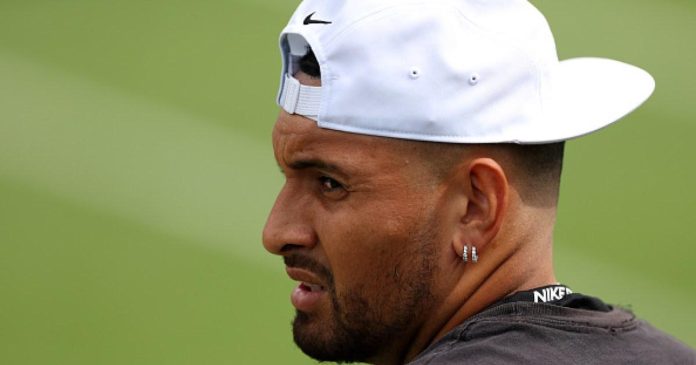In an Australian court last year, tennis player Nick Kyrgios pleaded guilty to assaulting ex-girlfriend, Chiara Passari.
The 27-year-old athlete admitted to pushing his former partner in 2021 and following an apology he remarkably escaped a criminal conviction.
So this week, as the Head of Media at Women’s Aid, I was shocked to hear the BBC announce Kyrgios as a pundit for Wimbledon.
There is little chance his guilty plea escaped the BBC’s attention, yet they are giving him a platform where he will be celebrated as a sporting personality.
That’s why we are calling for broadcasters to listen to survivors and work with specialist organisations to better understand domestic abuse.
This announcement has two major impacts: one on survivors of domestic abuse, and one on the attitude of the wider public.
We know first-hand that survivors are often sickened when they see abusers carry on with their lives seemingly consequence free. Especially if they have had their lives destroyed by such men.
It also sends a message to the public – that crimes like Kyrgios’s aren’t that serious and that men can hurt women with impunity.
In this case, the message to me is clear – assault a woman, admit it and an employer like the BBC might just seemingly sweep it under the carpet if you’re talented.
Domestic abuse helpline
If you are in immediate danger call 999. If you cannot talk, dial 55 and the operator will respond.
For emotional support, you can contact the National Domestic Abuse Helpline on 0808 2000 247. Alternatively, for practical and emotional support, please contact Women’s Aid Live Chat 10am – 6pm seven days a week.
You can also reach the National Centre for Domestic Violence on 0800 270 9070 or text NCDV to 60777.
For free and confidential advice and support for women in London affected by abuse, you can call Solace on 0808 802 5565 or email advice@solacewomensaid.org.
Male victims of domestic abuse can call 01823 334244 to speak to ManKind, an initiative available for male victims of domestic abuse and domestic violence across the UK as well as their friends, family, neighbours, work colleagues and employers.
Alternatively, the Men’s Advice Line can be reached at 0808 8010327, or emailed at info@mensadviceline.org.uk.
One in four women in England and Wales will experience domestic abuse at some point in their lives – that is a staggering number. But convictions for violence against women and girls remain incredibly low, in part because so many survivors are afraid to speak up and seek justice for fear of not being believed.
In Kyrgios’ case, a judge ruled that the assault was a ‘single act of stupidity or frustration’, which is concerning in itself – even if only one incident appears in court, domestic abuse is rarely a one-off event.
From our work with survivors, we know that domestic abuse takes many different shapes – from physical violence to the insidious, coercive control that underpins all forms of domestic abuse.
We also know that, for so many survivors, leaving an abusive relationship is incredibly difficult. It takes an average of seven attempts – all in the hopes that their partner will change, based on empty promises made by the perpetrator.
Decisions to appoint men like Kyrgios to a prominent role as a pundit for Wimbledon reiterates these fears and realities for many, demonstrating that men with power and influence will continue with their lives and flourish in their careers without any hindrance.
What these decisions don’t account for is the long-term impact domestic abuse has on survivors’ mental health. Survivors tell us of the trauma that domestic abuse leaves them with – the stress, the fear of abusive men, and the stigma that they can face from their community if they’re not believed.

Similarly, women – regardless of whether they watch Wimbledon or not – will hear the message loud and clear. That violence against us is tolerated by today’s society and the country’s biggest broadcaster is willing to appoint an admitted perpetrator of assault without seemingly any consideration for the experiences of survivors.
On top of that, Kyrgios’ support of a well-known misogynistic influencer Andrew Tate – who himself is facing charges of violence against women and girls – reflects his views. In February, Tate tweeted ‘what is love if not obsession’ and Kyrgios responded, ‘speaking facts as always’.
This backs the insight we have in our Influencers and Attitudes report about the link between supporting misogynistic influencers and finding domestic abuse tolerable. The research shows a link between misogynistic online content and unhealthy views on relationships, which Women’s Aid knows underpin domestic abuse.
For example, those who have viewed such content – including from influencers like Andrew Tate – are five times more likely to view physically hurting someone as acceptable if you say sorry afterwards.
These things are not unrelated because domestic abuse does not happen randomly – there are deeply harmful views about the roles of women and girls that underpin this harmful behaviour.
By criticising this choice, Women’s Aid will be criticised in return. Domestic abuse is excused, minimised and tolerated, and this will happen in real time as this story unfolds. This just demonstrates the scale of the problem we face.
But for those speaking out – or even thinking about it – you are part of building a future where domestic abuse will not be tolerated. Your voice matters, as charities like ours cannot do this alone.
Our Come Together campaign – which is our 50th anniversary year campaign – is about exactly that. It says that we all have a really important role to play in ending domestic abuse – women and men together discussing this important issue, letting survivors know they will be believed and supported. That their feelings matter, that their experience and trauma counts.
It’s not just the BBC though.
Only this year, ITV invited a man found guilty of assaulting his ex-partner on Celebrity Big Brother. While the relationship-based reality TV formats of Love Island and Married at First Sight saw concerning behaviour evolve on-screen – from misogyny to coercive control.
Broadcasters, you have a responsibility and it is vital you take it seriously. Listen to survivors and consider the trauma they live when making choices about who you select to platform in your programmes, and how you deal with controlling or misogynistic behaviour if it evolves in a show you are working on.
There are plenty of alternatives available and choosing a known abuser to platform is a choice that has consequences.
Domestic abuse doesn’t happen in a vacuum, the way we respond to it shapes what happens in the future – the choice is, do we tolerate it or not?
I’m more interested in the Euros than Wimbledon myself, but I am concerned about the message this sends to viewers and non-viewers alike. For the millions watching Wimbledon, please let’s think about who we are literally giving a microphone to.
To end abusive behaviour, we need to think carefully about who we shine the spotlight on.
Do you have a story you’d like to share? Get in touch by emailing jess.austin@metro.co.uk.
Share your views in the comments below.
MORE : Think missionary is boring? You haven’t been doing it right…
MORE : ‘Cherished’ BBC sitcom making epic return in ‘dream come true’ for Lee Mack
MORE : I spent £200 on a train ticket to have no seat, no WiFi and no toilet

Share your story or advertise with us: Whatsapp: +2347068606071 Email: info@newspotng.com

















